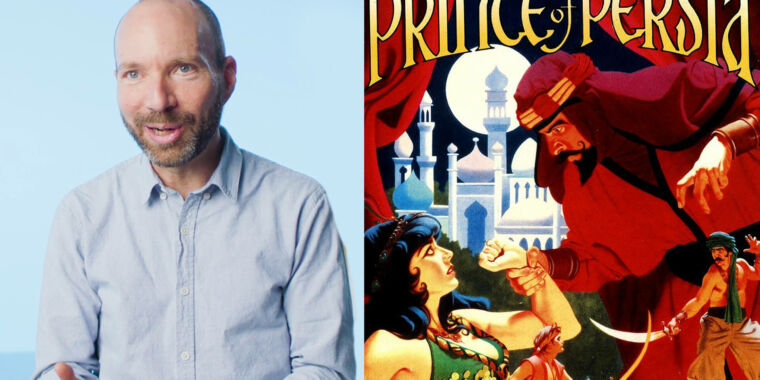War Stories: How Prince of Persia slew the Apple II’s memory limitations
We're resurfacing our Prince of Persia war story from last month to coincide with the release of PoP creator Jordan Mechner's book, The Making of Prince of Persia. If you missed the video last month, here's another chance to give it a look! And if you're interested in picking up a copy of Mechner's book, there's a link at the bottom of the piece.
I remember a lot of things about the summer of 1991 (like sneaking into the theater to watch Don't Tell Mom the Babysitter's Dead because my parents absolutely did not approve of movies that so clearly showed teenage disrespect for authority), but the thing I remember most about that summer is spending countless sun-dappled afternoon hours staring at a rotoscoped little dude on my computer screen as he died a million deaths. Sometimes he'd fall. Sometimes he'd be impaled by spikes. Sometimes he'd be chomped in half by giant steel jaws. And sometimes he'd collapse into a bleeding pile after crossing swords with pixellated bad guys.
It was, for me, the summer of Prince of Persia—and I was completely entranced.
Created by Jordan Mechner a couple of years earlier in 1989 for the Apple II, the MS-DOS port of PoP came thundering onto shelves near the end of 1990, just as the Apple II platform was gasping its last breath as a viable gaming platform. Mechner had quite famously spent literally years working on the game's animations, tracing them from videotaped recordings of his brother (also of Errol Flynn, interestingly enough), but I didn't learn about any of that until some time later. All I knew was that from the moment that game came into my life—likely purchased from our friendly neighborhood Babbage's—I was hooked.
In ancient Persia...
Mechner's game had a long road from development to the screen, but what I learned from our interview with the man is just how much the Apple II's memory limitations shaped the game's final form—even though none of those limitations applied to the platform on which I (and the majority of players, going by sales numbers) first experienced PoP.
-
Prince of Persia creator and designer Jordan Mechner looking at our set prior to filming.
-
Artboard holding some of Mechner's PoP rotoscope frames.
-
Our IBM PC 5150, used here for set dressing.
-
Ahhh, memories.
-
Director/producer Justin Wolfson (in silhouette) preps the shoot while Mechner contemplates.
-
A peek behind the camera during production.
The biggest impact was that up until the tail end of development, PoP was going to be a largely solitary experience, with a non-violent character platforming his way through a series of dungeons to rescue the princess. The available RAM was simply too sparse to include any additional characters with their own animations and sound effects that would eat precious bytes. But one afternoon, after repeated prodding by another developer with whom Mechner was sharing office space, Mechner took advantage of some 6502 assembly instructions and coded up a bit-shifted bad guy that used the protagonist's animations and sounds—and suddenly the game had a real antagonist.
It was the kick needed to transform an interesting but not terribly exciting platformer prototype into a focused gaming experience, and it led Mechner to pull out all the stops and pull together the additional memory needed for a few more sword-swinging bad guys. He scavenged precious bytes from unused system locations, and, as they say, the rest is history.
Founding a dynasty
PoP went on to become one of the most revered classic games of all time, with ports to more than a dozen platforms and multiple sequels (though the standout game in the series is probably 2003's Sands of Time, which Mechner was involved with and which influenced a lot of '00s-era game design). It's a storied game with a storied history, and it's difficult to find a gamer who lived through the 1990s who hasn't played a game in the series.
Watching this video come together meant a lot to me, because as with so many classic gaming titles, just seeing the images and hearing the sounds evokes memories of long, lazy summer vacation days, where the only decision I had to make was how long I wanted to play on the computer before meeting up with my buddies at the neighborhood swimming pool. Retrogaming is a powerful thing, and anyone who argues that games aren't legitimately art is either dead inside or a total idiot.
Ars would like to extend a special thanks to Jordan Mechner for the extensive assistance he provided in making sure we got the technical details of this video right (especially the assembly language part!). Videos like these wouldn't be possible without enthusiastic developer support, and we're grateful he's still excited to talk about old games with us.
(Speaking of Mechner: the book he mentions near the end of the video, The Making of Prince of Persia: Journals 1985-1993, should be available for pre-orders on Amazon starting today. If you're a fan of the game, this would make an excellent addition to your library!)








Gloss